A letter from Ingrid Reneau Walls serving in Ghana
DECEMBER 2014 - DANCING TO AFRICAN RHYTHMS
Dance, then, wherever you may be. I am the Lord of the dance, said he. And I’ll lead on to wherever you may be, and I’ll lead you on in the dance said he.
—From “Lord of the Dance” by Sydney Carter
PREAMBLE
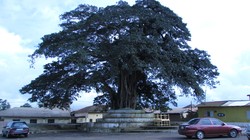
Akropong's ancestral tree, Mpeni

The mango tree beside our abode that houses those riotous birds
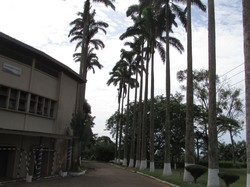
The College's campus —the palm trees are native to Akropong, though over the years most have been cut down
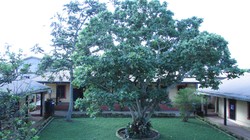
ACI's verdant tree
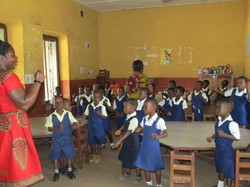
Preschoolers across the street at the Presbyterian Model Pre-school
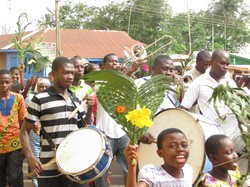
PCG Brass Band and Easter paraders in Akropong
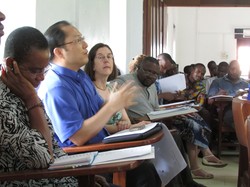
Participants at “The African Diaspora in Christian History” Doctoral Seminar that Andrew and I led at ACI
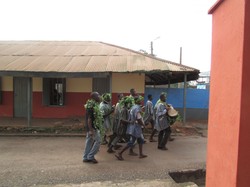
Announcing the passing of a local chief; the Presbyterian Model Primary school in the background
Strolling along Stanley Street, Aberdeen, Scotland, I’m struck by the brightly lit Christmas trees prominently displayed in bay windows. Every home seems to declare: Christmas is here! This surprises me because walking down Aberdeen’s main street, one sees grand structures that were once churches and Christian colleges that are now restaurants, casinos, and nightclubs. From this one could think that Christianity is declining here; yet, if Christmas trees in homes indicate Christianity’s presence, then from Stanley Street one would have to think Christianity is alive in this town. Does a point exist, then, where Christmas trees need not be directly connected to Christianity or with a celebration of the birth of the Christ of Christmas itself? Perhaps…. Notwithstanding, I’m thinking about trees and their place in celebrating the Life of Immanuel, as well as their place in celebrating our lives in mission service. So this Christmas, whether with or without a Christmas tree display, I pray each of you and your families will enjoy a happy, holy celebration of our Lord Jesus' birth and will welcome the new year 2015 with joy and thanksgiving for the promises of Jah that will be fulfilled with/in your lives, amen.
Clearly life has its rhythms, the ones we create and the ones into which we enter and improvise, as we do at Christmas. Akropong, the small, traditional Ghanaian town in which I am serving, has rhythms to which I’m learning to dance. My movements are inspired by two marvelously vibrant trees, neither of which could be mistaken for a Christmas tree: one, with its cathedral limbs and sunshine-sea glittering leaves, lies at the heart of Akrofi Christaller Institute (ACI), and the other, with its dense canopy of evergreen leaves, stands at the heart of Akropong. Nourished by the underground streams of Christian mission, ACI's verdant tree anchors the restored 1850s quadrangle buildings of the Basel mission, which now house ACI’s central campus. One block away, across from the Omanhene’s Palace, rooted in the primal ritual grounds of the town, lies Mpeni, the sacred ancestral tree of Akropong’s inhabitants. Between these rhythms of Western Christian mission and its legacy and those of Akropong’s indigenous religious traditions and rituals, I move to the Holy Spirit’s melody as an academic writing instructor among other academic responsibilities at ACI.
Most mornings I’m awakened by the 5:00 a.m. mega-amplified praises and worship of the College’s morning devotion. Known as "the Mother" of Presbyterian colleges—the Presbyterian Teacher Training College was founded in 1848—it is located behind ACI’s campus. If I’m not awakened by the College’s early morning rhythms, then it’s by the 4:30 or 5 a.m. prayer meeting of Presbyterian Church of Ghana (PCG) members being held in one of the classrooms of the Presbyterian Model/Training Primary School, which is a stone’s throw across the street from our Coconut Guest House. And every weekend, apart from the six weeks leading up to Odwira (the one-week ritual cleansing and renewal of the community celebrated during the annual Yam festival) there are funerals. In a traditional town such as Akropong, these are major celebrations consisting of amplified music and traditional drumming and dancing. And if these are not the rhythmic sounds that fill my early morning, midday and evenings, there are also the daily call-and-response language drills, recitations, songs and dances of the preschoolers across the street, or the kinetic energy, varied tones and vibrancy of all 300 or more primary schoolers congregating in front of ACI’s building when school is over for the day. At dusk the birds—various varieties, hundreds of them—descend into the huge mango tree beside the gated entrance to our compound; their exchanges as they prepare for their night rest, as well as their early morning greetings, are riotous.
Amidst these religious and educational rhythms, ACI was founded and established more than 26 years ago by PCG pastor and leading theologian of his generation, the late Rev. Dr. Kwame Bediako and his wife, Professor Gillian Mary Bediako, ACI’s deputy rector. Having established a local, regional and international reputation for excellence in postgraduate theological education, ACI now trains Christian leaders from 17 African nations, the U.S.A., UK, Canada, Australia and Korea. This includes those not only from such PC(USA) partner churches as the Presbyterian Churches of Ghana, Rwanda, Cameroon, Nigeria, Sierra Leone, Korea and the Evangelical Presbyterian Church; it also includes Christian leaders from the Pentecostal Church of Ghana, the Methodist Church of Ghana, the Assemblies of God, the Evangelical Lutheran Church of Tanzania, the Free Baptist Church in the U.S.A., Church of the Province in Kenya, GHAFES: Ghana Fellowship of Evangelical Students (the Ghana branch of Inter Varsity), Canadian Baptist and Lighthouse Church International, to name a few. As the first postgraduate theological institution in Ghana to offer M.A., M.Th. and Ph.D. degrees in African Christianity within the broader world Christianity context, ACI is not just a unique Ghanaian entity but an international institution engaged in making contributions to the world Church.
Moreover, because these contributions occur in this traditional town of Akropong, they are in a continuum of African Christianity expressions, which also include the celebrations of Christian holidays such as Easter. Here children and adults walked and danced joyfully through the streets to the polyrhythmic accompaniment of the PCG brass band; as they danced-walked, they waved and held high the creatively decorated palm fronds they’d made. It was a festive celebration to say the least. Later there was another parade, and this one was mobile, in cars and floats, travelling through Akropong to Adukrom, about eight miles away. Throughout the length of the journey church members danced, sang, waved palm fronds and transmitted to each passing town the celebration that is Easter: the resurrected Lord Jesus, Saviour of the world. It was fun and exhausting because many times I’d get out of the car or truck I was in to take pictures, and all along the route as we passed different communities people would join in the celebratory dancing and singing.
But before Easter there were the hard historical and cultural rhythms of African Christian discourse focused on the harsh, in need of healing, realities of Africa and its Diaspora; this too constitutes the continuum of ACI’s contribution to world Christianity. These rhythms of reciprocity across the Atlantic can be the most difficult to dance. Still, from March 31 to April 4 Andrew and I participated together for the first time in ACI’s annual Doctoral Seminar; our topic was "The African Diaspora in Christian History." We each gave two lectures; mine were Africa and the Caribbean, and The Literature of the African Diaspora and Its Relation to Christianity; the third lecture, which we gave jointly, was titled The First and Second African Diasporas and their Significance for 21st Century Christianity. We each led separate sessions in which we vigorously engaged and discussed primary texts—fiction and poetry—of the African Diaspora. These were insightful, moving discussions during which ACI’s graduate students and faculty members and participants from other institutions, both academic and otherwise, made some welcomed connections about the Transatlantic Slave Trade and its aftereffects on relationships between Africans on the continent and the descendants of those enslaved Africans now known as first-generation African-Americans. One of ACI’s Korean graduate students made a startling connection between some survival strategies of enslaved Africans and their descendants and some Koreans who survived capture and torture during the Japanese occupation of Korea.
After our seminar an event occurred that points to new opportunities for ACI to continue exploring the Africa–African Diaspora connections in promising ways. In July ACI offered its first Ph.D. intensive course to three African-American professionals with D.Min. degrees who are faculty and administrators of a theological institution in the U.S.A. For these women ACI was their first place of choice for a Ph.D. with a focus on African Christianity. According to Lydia, as an African-American of the first African Diaspora she’d long wanted to attain a graduate degree in Africa; when she learned about and visited ACI in 2008, it became the place she wanted to come. Still, due to varying responsibilities, that desire was not finally fulfilled until July 2014. This start, which was in many ways a revelation as well as a welcomed reconnection, serves as a bridge over which many future discourses on the relevance of the Africa in the Americas to the African continent will emerge. At its heart will be our mutual African Christian heritage, which I hope will become the site of visionary Christian scholarship and myriad other forms of the quintessential South-South exchanges insofar as Africa and its contributions to world Christianity are concerned.
As ever, I thank each of you for your continued support, both prayerfully and financially, of me in mission. Enjoy even more than ever, the Christ of Christmas, and please stay tuned for Part II of this newsletter, soon to follow.
In the Love of Immanuel,
Ingrid
The 2015 Presbyterian Mission Yearbook for Prayer & Study, p. 131
Read more about Ingrid Reneau's ministry
Write to Ingrid Reneau
Individuals: Give online to MI910022 for Ingrid Reneau's sending and support
Congregations: Give to D507538 for Ingrid Reneau's sending and support
Churches are asked to send donations through your congregation’s normal receiving site (this is usually your presbytery).
Double Your Impact!
A group of committed donors has pledged to match all gifts sent by individuals for mission personnel support now through December 31, 2014, up to $137,480. This means your gift today will be matched by a gift to support mission personnel around the world, wherever the need is greatest. We invite you to take advantage of this wonderful opportunity to double the impact of your gift. Thank you!

